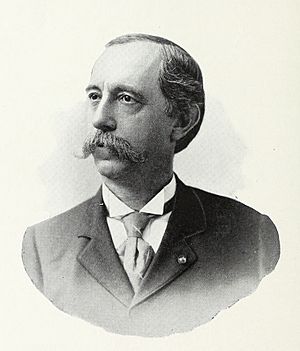John Randolph Lewis facts for kids
Quick facts for kids
John Randolph Lewis
|
|
|---|---|
 |
|
| Born | September 22, 1834 Edinboro, Pennsylvania, U.S.
|
| Died | February 8, 1900 (aged 65) Chicago, U.S.
|
| Resting place | Arlington National Cemetery |
| Nationality | American |
| Education |
|
| Occupation |
|
| Military career | |
| Allegiance | |
| Service/ |
Union Army |
| Years of service | 1861–1865 |
| Rank | |
| Unit |
|
| Battles/wars | American Civil War |
John Randolph Lewis (September 22, 1834 – February 8, 1900) was an American dentist, soldier, and public servant. He is especially remembered for his important work with the Freedmen's Bureau after the American Civil War. This organization helped formerly enslaved people.
Early Life and Education
John Randolph Lewis was born in Edinboro, Pennsylvania. When he was 15, he moved to Buffalo, New York. There, he began studying dentistry with his uncle, John Lewis. In 1856, he married Frances Helen Mattice.
He later attended the Pennsylvania College of Dental Surgery. He earned his Doctor of Dental Surgery (DDS) degree in 1858. After this, he and his wife moved to Burlington, Vermont. He continued his studies at the University of Vermont, where he earned a Doctor of Medicine (MD) degree. He worked as a dentist until the Civil War began.
Service in the Civil War
When the American Civil War started, John Lewis joined the Union Army. On April 20, 1861, he enlisted as a private in the 1st Vermont Volunteer Infantry Regiment. He fought in his first battle, the Battle of Big Bethel, in June 1861.
In September 1861, he joined the 5th Vermont Volunteer Infantry Regiment as a Captain. He quickly rose through the ranks. By July 1862, he was promoted to Major. In October 1862, he became a Lieutenant Colonel.
During the Battle of White Oak Swamp in June 1862, Lewis was injured. A piece of an artillery shell hit his right leg. He continued to fight in many battles with his regiment. However, in May 1864, he was severely wounded during the Battle of the Wilderness. His left arm had to be removed at the shoulder. He was sent to Buffalo, where his wife cared for him. In September 1864, he was honorably discharged from his regiment. He then joined the Veteran Reserve Corps (VRC) as a colonel. By March 1865, he was promoted to Brigadier General.
Lewis worked on the VRC's examining board until the war ended in June 1865. His job was to check on injured soldiers in hospitals. He decided if they were too hurt to return to duty.
Life After the War
After the Civil War, Lewis continued his service. He was sent to Elmira Prison to take over as Post Commander. His task was to parole and send home all the prisoners. In December 1865, he moved to Nashville, Tennessee. There, he worked as an assistant inspector-general for Clinton Fisk.
Lewis later became the assistant commissioner for the Tennessee Freedmen's Bureau. This organization helped formerly enslaved people find jobs, homes, and education. In January 1867, he was moved to Georgia. He became the staff inspector-general for Caleb C. Sibley, who was the assistant commissioner of the Georgia Bureau.
In March 1867, Lewis left the Army. However, he was asked by Ulysses S. Grant to join the 44th Infantry Regiment as a major. Grant knew Lewis's injury would make it hard for him to practice dentistry. In October 1868, Lewis became the assistant commissioner for the Freedmen's Bureau in Georgia. He focused on setting up schools for newly freed people.
In April 1870, Lewis retired from the military as a colonel. He was then asked to become Georgia's first State School Superintendent. He helped create the public school system in Georgia. After two years, he retired from this role.
In 1873, Lewis moved to Iowa to start a business. By 1880, he returned to Georgia. He became involved in several community roles. He was the assistant secretary for the 1881 International Cotton Exposition. He also served as secretary for the 1895 Cotton States and International Exposition. In 1889 or 1890, he was named Postmaster of Atlanta, a position he held for four years.
John Randolph Lewis passed away in Chicago on February 8, 1900.
 | Aaron Henry |
 | T. R. M. Howard |
 | Jesse Jackson |

